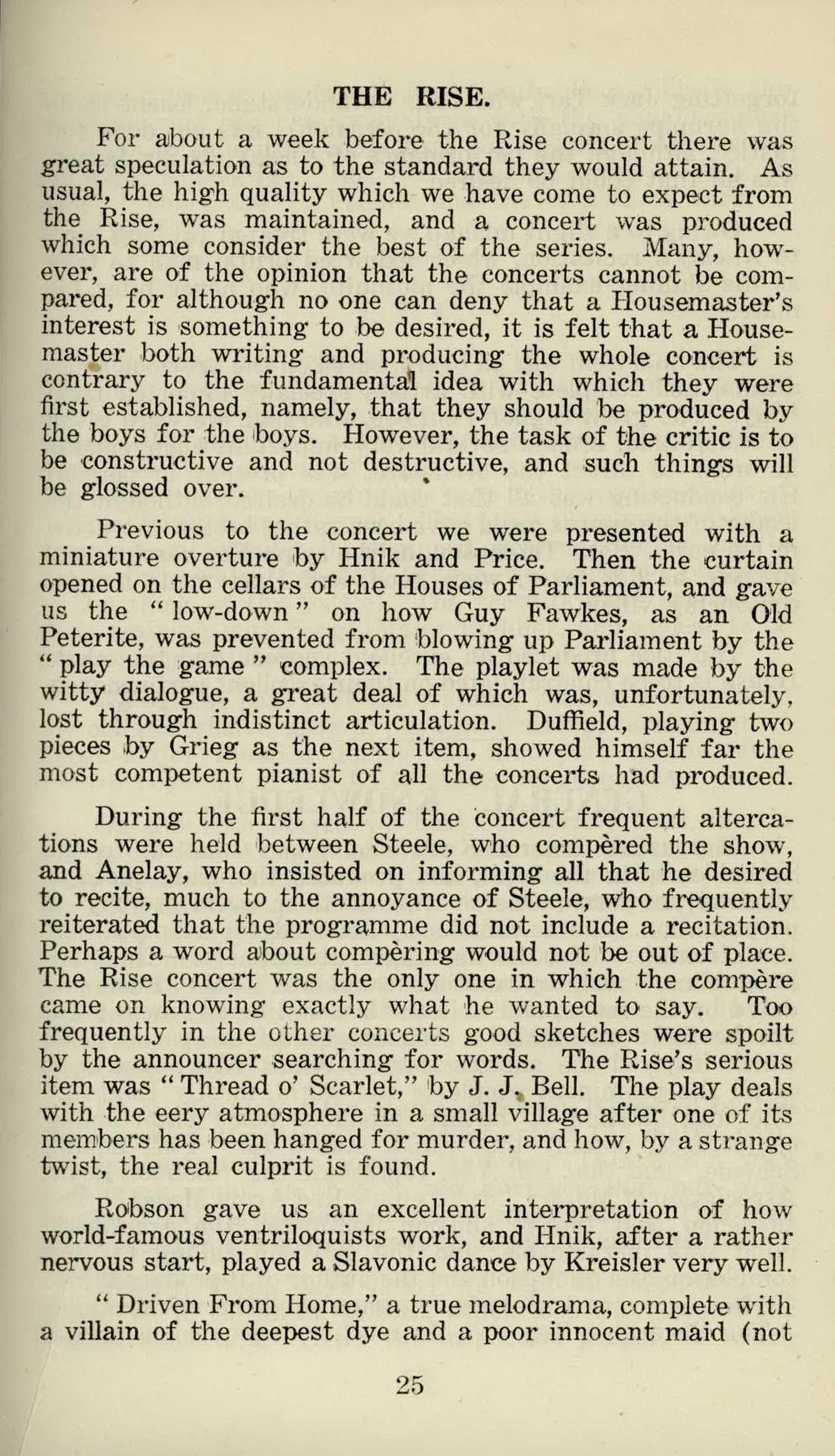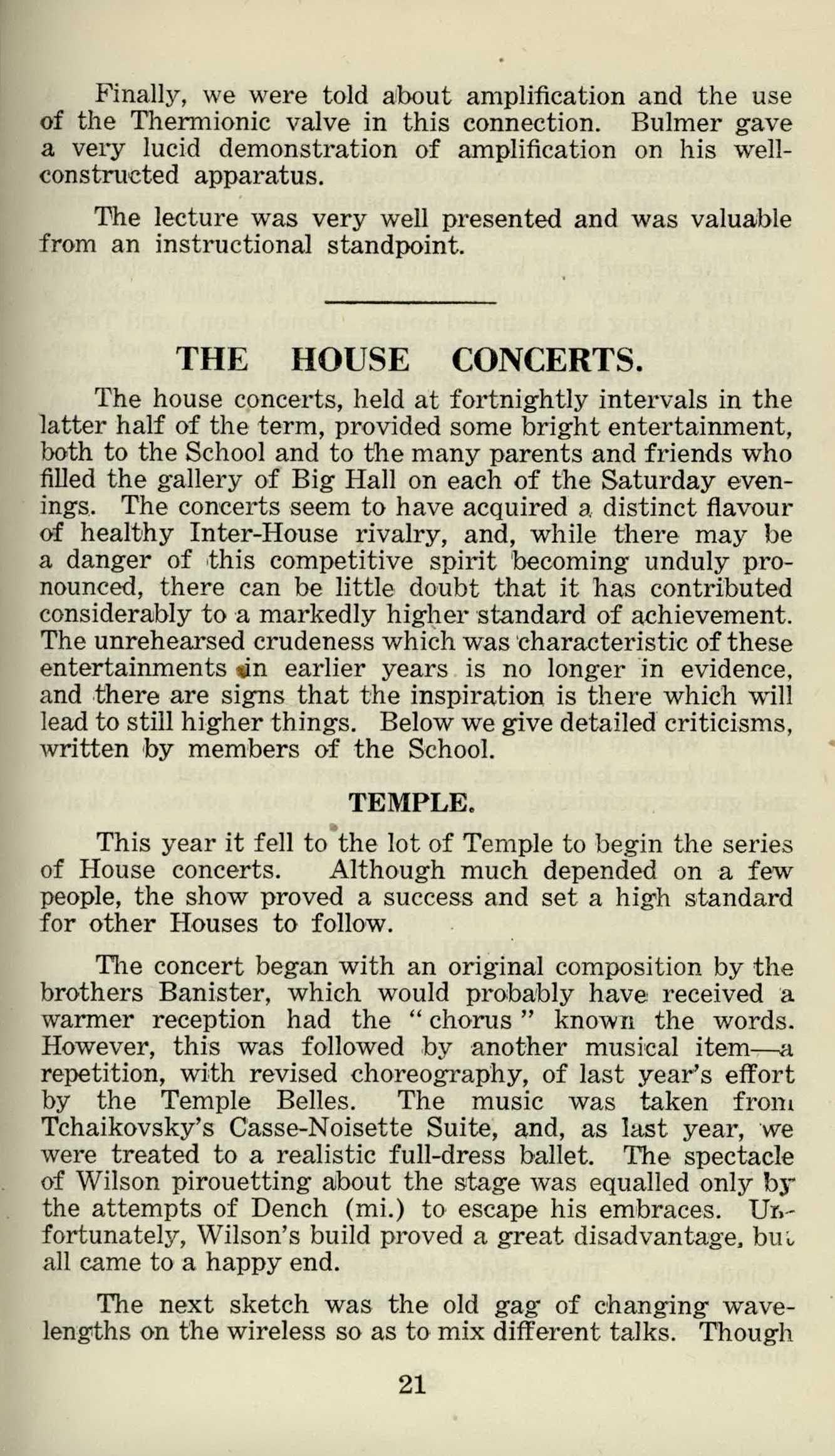
9 minute read
The House Concerts
from May 1943
by StPetersYork
Finally, we were told about amplification and the use of the Thermionic valve in this connection. Bulmer gave a very lucid demonstration of amplification on his wellconstructed apparatus.
The lecture was very well presented and was valuable from an instructional standpoint.
The house concerts, held at fortnightly intervals in the latter half of the term, provided some bright entertainment, both to the School and to the many parents and friends who filled the gallery of Big Hall on each of the Saturday evenings. The concerts seem to have acquired a distinct flavour of healthy Inter-House rivalry, and, while there may be a danger of this competitive spirit becoming unduly pronounced, there can be little doubt that it has contributed considerably to a markedly higher standard of achievement. The unrehearsed crudeness which was characteristic of these entertainments sin earlier years is no longer in evidence, and there are signs that the inspiration is there which will lead to still higher things. Below we give detailed criticisms, written by members of the School.
TEMPLE.
This year it fell to sthe lot of Temple to begin the series of House concerts. Although much depended on a few people, the show proved a success and set a high standard for other Houses to follow.
The concert began with an original composition by the brothers Banister, which would probably have received a warmer reception had the " chorus " known the words. However, this was followed by another musical item—a repetition, with revised choreography, of last year's effort by the Temple Belles. The music was taken front Tchaikovsky's Casse-Noisette Suite, and, as last year, we were treated to a realistic full-dress ballet. The spectacle of Wilson pirouetting about the stage was equalled only by the attempts of Dench (mi.) to escape his embraces. Unfortunately, Wilson's build proved a great disadvantage. bui, all came to a happy end.
The next sketch was the old gag of changing wavelengths on the wireless so as to mix different talks. Though
unoriginal, it seemed to be appreciated by the audience. A welcome change was afforded by Terry on the piano. He played an arrangement of the now familiar Tchaikovsky Piano Concerto, followed by Grieg's delightful " Butterfly," The first half of the concert finished poorly, however, with a futile presentation of " Love on the Staff."
The second half was better, opening with a sketch concerning a weary (though irrepressible) traveller seeking a night's lodging in a haunted house. Dench (sen.) and Terry, as the butler and traveller respectively, gave good performances. Next we were given a musical interlude—a very clever arrangement of " Bobby Bingo," for percussion, chorus and piano. This was followed by an interlude, given over to back-chat between Banister and Terry, and ending with a rather amusing adaptation of " Widdicombe Fair." " Spring comes to Vladivostock " caught the audience napping, but they were restored by the expert piano playing of Bulmer, Who once more proved very popular with the audience. The show closed with a skit on the School play, entitled " Cleopatra and Caesar." It was somewhat disappointing, and many of us though that opportunities for a real climax to the concert were lost. The main criticism was its lack of cohesion, and although it was at times amusing, it was, in places, rather weak.
In general, however, the concert was most enjoyable and gave a promising send-off to this year's series. All are to be congratulated on an excellent. production. F. L.D.
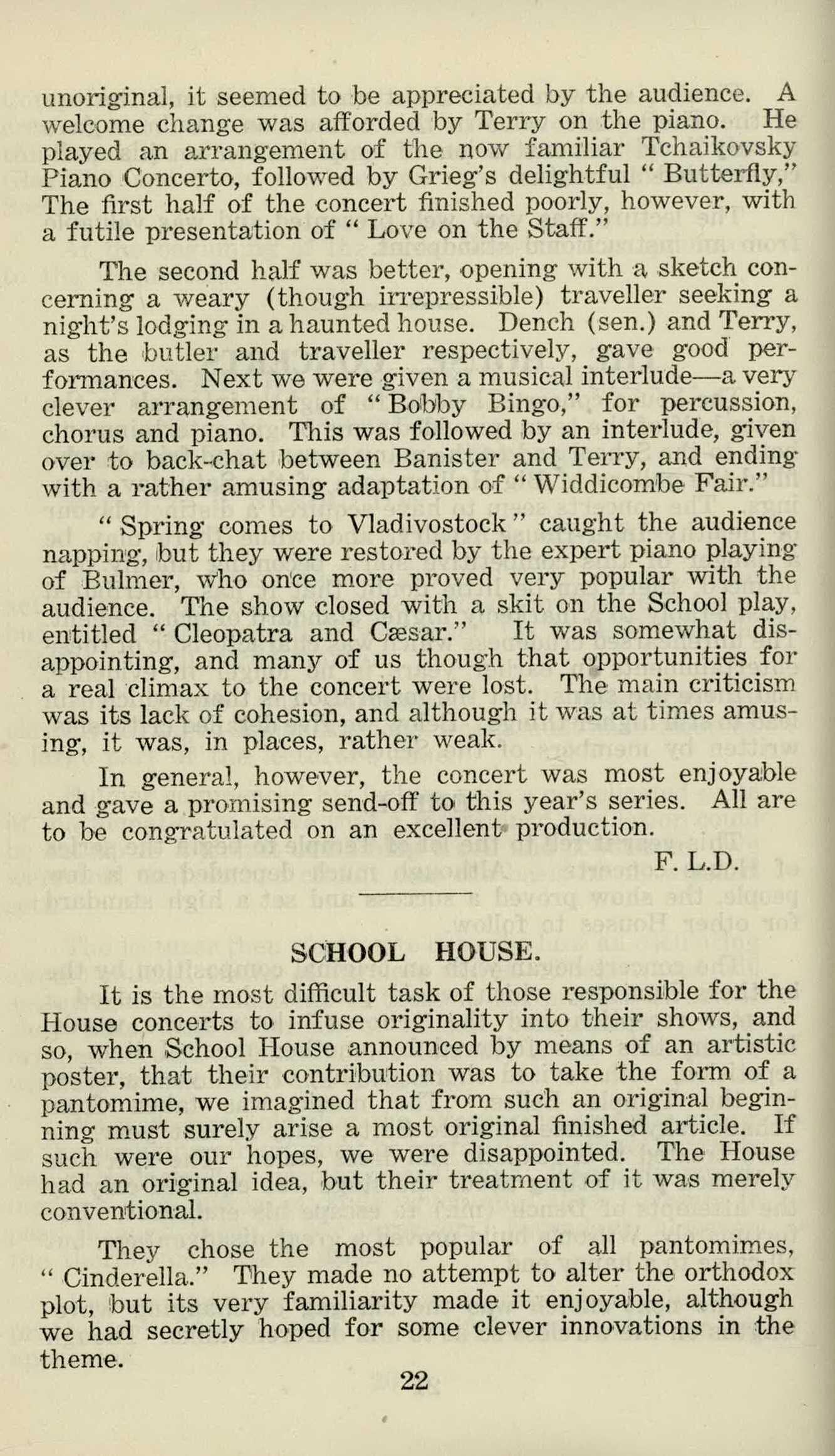
SCHOOL HOUSE.
It is the most difficult task of those responsible for the House concerts to infuse originality into their shows, and so, when School House announced by means of an artistic poster, that their contribution was to take the form of a pantomime, we imagined that from such an original beginning must surely arise a most original finished article. If such were our hopes, we were disappointed. The House had an original idea, but their treatment of it was merely conventional.
They chose the most popular of all pantomimes, " Cinderella." They made no attempt to alter the orthodox plot, but its very familiarity made it enjoyable, although we had secretly hoped for some clever innovations in the theme.
Like all pantomimes, this one had its two-man cow (both of whose anonymous portions we heartily congratulate), its one-sided bench, and its community singing. But it had also a semblance of originality in the jokes of personal and individual significance which were included. Many of Mr. Jackson's favourite phrases found their way into the dialogue, and we had indirect reference to " farm-camp " jokes, and School topics, which aroused appreciative laughter.
It is difficult to mention one character without mentioning them all. Middleton, as the impecunious baron, had a confident and winning stage manner, but was inclined to be indistinct at times ; Caley played the Widow adequately, while Leigh made an admirably malevolent Demon. The Brokers' men provided the " slap-stick " comedy: McKinla3r's accent was convincing and almost natural, but Endecott's excellent performance was perhaps the evening's surprise item. Peel and Wright were well cast as the Ugly Sisters, though at times we thought they should not have left so much of their raiment in the dressing-room. Of the more serious characters,. played by Spink, Jefferson, Edinger and Hilton, we can only say that we sympathised with their difficult position. Theirs was the task of forwarding the plot, and of trying to be moderately serious in the midst of buffoonery. We feel that their scripts did not receive the attention they deserved, but they coped with the situation well. We would especially praise Spink's princely bearing and equally princely costume.
The standard of production was no higher than that expected from the House concerts. As usual, more attention was paid to the mechanical aspect, to one-sided benches and artificial cows, than to the more important aspect of articulation, gesture, and stage manner, which are so inconspicuous when present and so noticeable when absent. Moreover, the pauses between the scenes, though perhaps unavoidable, were, nevertheless, unfortunate.
In spite of these faults, many of which can be traced to shortage of time for rehearsals, the School House pantomime was well received by an appreciative audience, and we congratulate them upon a most enjoyable hour and a half's entertainment. J. M. B.
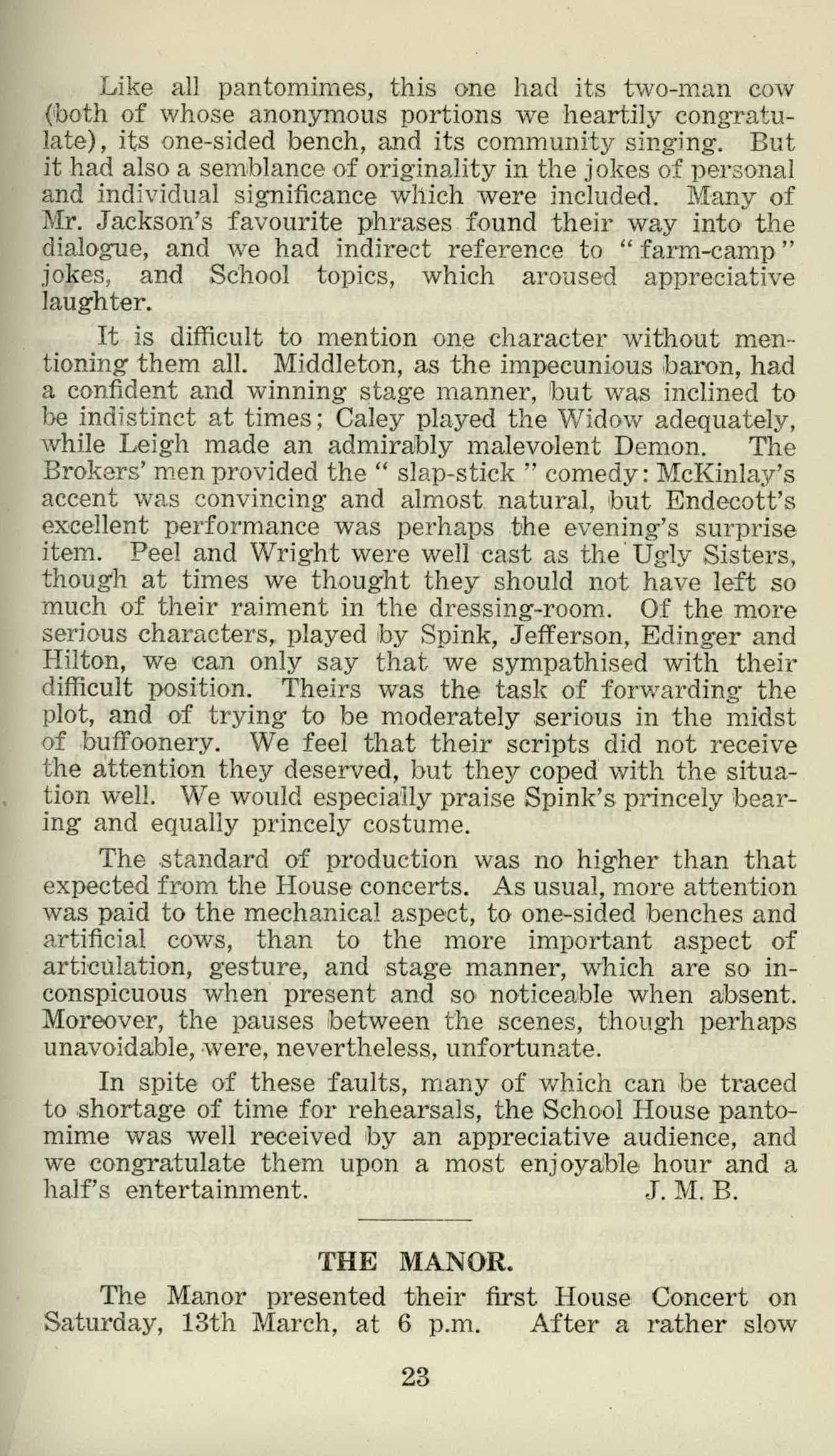
THE MANOR.
The Manor presented their first House Concert on Saturday, 13th March, at 6 p.m. After a rather slow
beginning, it warmed up gradually, and the second half was very enjoyable, particularly so on account of a " Quiz," an entirely novel idea. " Love under Fire," the opening item, showed us what really happens during the production of a wireless play, and the general state of confusion which results (possibly) in the well-known apology, " a slight technical hitch." The attempt to create the illusion of a wireless play IV voices through a closed curtain was perhaps necessary, but it was none the less unfortunate, since it was not conducive to a lively beginning.
A. J. Shardlow then played Tschaikovsky's " Valse des Fleurs," which, if it was taken rather too slowly, was at any rate accurately rendered. The chief merit of the next sketch—about the trials of a play producer—which was entitled " Love at the Mill," was that it was entirely written and acted by the Juniors. The plot in itself was-rather trifling. The audience greatly appreciated Davison's song, " Ma Curly-headed Babby," and called for an encore, which was not, however, forthcoming.
The last item before the interval was a sketch, which took place in a recruiting office, where an Army doctor was inspecting a very voluable " recruit," who, it turned out later, had only come to warn the sergeant on duty that his house was on fire. The idea was far from original, but we were treated to some extremely witty dialogue and some clever punning.
After the interval, D. H. Denholm and D. L. Pryer appeared in a one-act play called " The Second Guest." Both acted very ably, the one as a man trying to frighten his guest to death in vengeance for the murder of a friend, and the other as the terror-struck guest. They are to be congratulated on sustaining a high pitch of excitement and maintaining the interest to the last. " The Second Guest " was Death!
Following on a couple of duets by Brindley and Simpson, came the high-spot of the programme, a " Quiz." For this two members of each House in the audience were invited on to the stage, and there each of them was asked two extremely awkward or difficult questions. The results were entirely unrehearsed and, judging by the laughter of the audience, the results were found pretty amusing.
Finally, Davison, Denholm, and Pryer formed the nucleus of some community singing, in which the audience joined heartily. P. F. T.
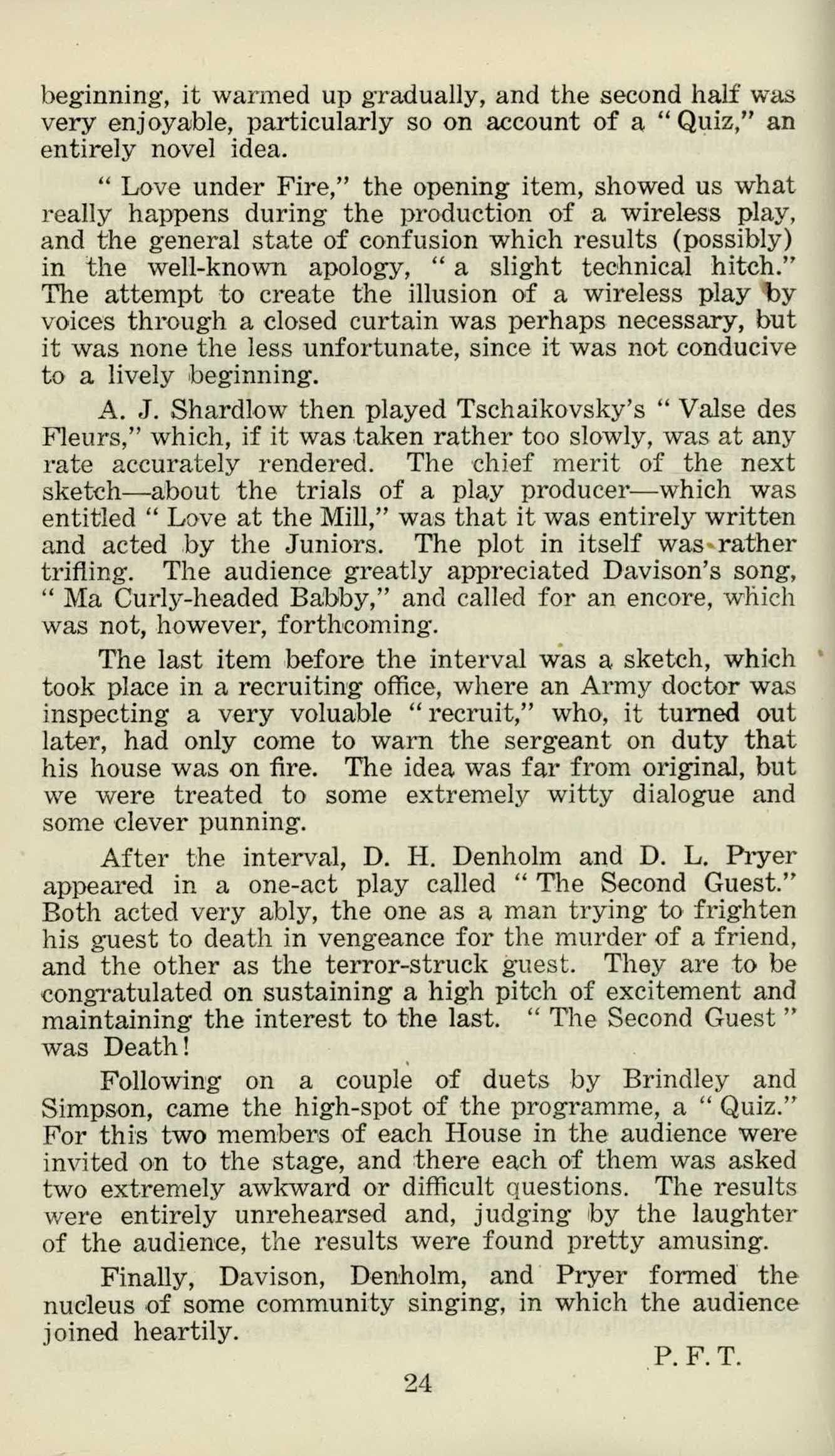
THE RISE.
For about a week before the Rise concert there was great speculation as to the standard they would attain. As usual, the high quality which we have come to expect from the Rise, was maintained, and a concert was produced which some consider the best of the series. Many, however, are of the opinion that the concerts cannot be compared, for although no one can deny that a Housemaster's interest is something to be desired, it is felt that a Housemaster both writing and producing the whole concert is contrary to the fundamental idea with which they were first established, namely, that they should be produced by the boys for the boys. However, the task of the critic is to be constructive and not destructive, and such things will be glossed over.
Previous to the concert we were presented with a miniature overture by Hnik and Price. Then the curtain opened on the cellars of the Houses of Parliament, and gave us the " low-down " on how Guy Fawkes, as an Old Peterite, was prevented from blowing up Parliament by the " play the game " complex. The playlet was made by the witty dialogue, a great deal of which was, unfortunately, lost through indistinct articulation. Duffield, playing two pieces by Grieg as the next item, showed himself far the most competent pianist of all the concerts had produced.
During the first half of the concert frequent altercations were held between Steele, who compered the show, and Anelay, who insisted on informing all that he desired to recite, much to the annoyance of Steele, who frequently reiterated that the programme did not include a recitation. Perhaps a word about compering would not be out of place. The Rise concert was the only one in which the compere came on knowing exactly what he wanted to say. Too frequently in the other concerts good sketches were spoilt by the announcer searching for words. The Rise's serious item was " Thread o' Scarlet," by J. J ., Bell. The play deals with the eery atmosphere in a small village after one of its members has been hanged for murder, and how, by a strange twist, the real culprit is found.
Robson gave us an excellent interpretation of how world-famous ventriloquists work, and Hnik, after a rather nervous start, played a Slavonic dance by Kreisler very well. " Driven From Home," a true melodrama, complete with a villain of the deepest dye and a poor innocent maid (not
